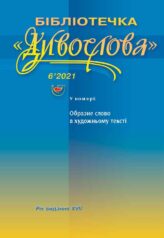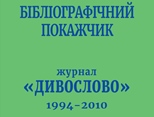 /-->
/-->
Стаття №8 з журналу «ДИВОСЛОВО» №4 (769) 2021 р.
СЕМАНТИКА РЕГУЛЯТИВА БАТЬКО / ОТЕЦЬ
У ПОСЛАННЯХ АНДРЕЯ ШЕПТИЦЬКОГО
Тетяна ТАРАСЮК, кандидат філологічних наук, доцент Волинського національного університету ім. Лесі Українки, керівник секції української мови Волинської обласної Малої академії наук
Анастасія КОСЕНКО, учениця 10 класу «Гімназії № 14 ім. Василя Сухомлинського» м. Луцька, слухачка секції української мови Волинської обласної Малої академії наук
У статті розглянуто лексеми батько й отець із позиції теорії регулятивності. На матеріалі послань митрополита Української греко-католицької церкви Андрея Шептицького простежено особливості актуалізації лексичного регулятива батько / отець у релігійному мовленні. З’ясовано, що обидві лексеми регулятива синонімічні, хоча виконують дещо відмінні функції. Узвичаєний для релігійного стилю регулятив отець зафіксований у трьох значеннях – батько щодо своїх дітей, священник чи Папа Римський, Бог. Кожне з них увиразнене усталеними для релігійного спілкування епітетами: духовний, святійший, добрий, милосердний. Аналогічної семантики в ідіостилі Андрея Шептицького набуває й регулятив батько, що слугує засобом інтимізації спілкування митрополита з гіпотетичним адресатом. Регулятив батько частотніший для іменування земного батьківства чоловіка щодо своїх дітей, регулятив отець – щодо Бога.
Ключові слова: лексичний регулятив, теорія регулятивності, послання, релігійний стиль, ідіостиль.
SEMANTICS OF THE REGULATORS BAT’KO / OTETS (FATHER):
A CASE STUDY OF ANDREI SHEPTYTSKY’S EPISTLES
Tetiana TARASIUK, PhD in Philology, associate professor, Lesya Ukrainka Volyn National University, the Head of the Ukrainian Language Section at Volyn Regional Small Academy of Sciences
Anastasiia KOSENKO, 10-th form student of Lutsk Educational Complex “Vasyl Sukhomlynsky Gymnasium No14” at Lutsk City Council of Volyn Region, Member of the Ukrainian Language Section at Volyn Regional Small Academy of Sciences
The article considers the lexemes bat’ko and otets (father/parent) from the standpoint of the language regulation theory. The case study of Andrei Sheptytsky’s epistles, the Metropolitan of the Ukrainian Greek Catholic Church, provides an opportunity to reveal the peculiarities of the lexemes bat’ko and otets (father) actualization in the religious language. The study reveals that both regulatory tokens are synonymous, although they perform somewhat different functions. The regulator otets, the conventional norm in the Ukrainian religious context, is fixed in three principal meanings: father in relation to his children, to the priest or the Pope, and God. Each of them is reinforced by the epithets accepted in the religious communication: spiritual, holy, saintly, kind, merciful. The regulatory unit bat’ko acquires a similar semantics in the idiostyle of Andrei Sheptytsky and serves as a means to add some intimacy to the communication between the metropolitan and a hypothetical addressee. The lexeme bat’ko is more frequent in naming the earthly fatherhood of a man in relation to his children, while otets – in relation to God.
Keywords: lexical regulation, theory of regulation, epistles, religious style, idiostyle.

